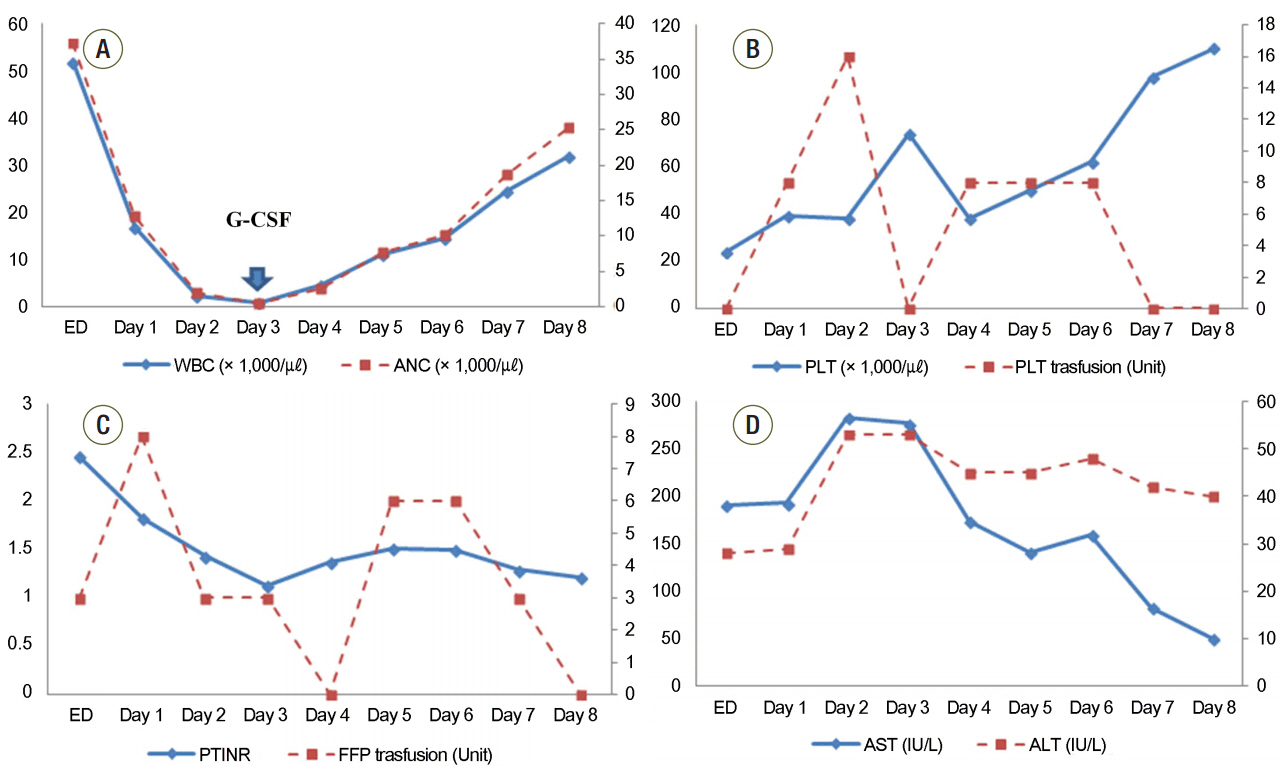Korean J Crit Care Med.
2015 Aug;30(3):207-211. 10.4266/kjccm.2015.30.3.207.
Acute Colchicine Poisoning Treated with Granulocyte Colony Stimulating Factor and Transfusion
- Affiliations
-
- 1Department of Emergency Medicine, Pusan National University Hospital, Busan, Korea. psu52156@naver.com
- KMID: 2227651
- DOI: http://doi.org/10.4266/kjccm.2015.30.3.207
Abstract
- Colchicine poisoning is rare but can cause potentially life-threatening toxic complications such as hypovolemic shock, cardiovascular collapse and multiple organ failure. In this case report, we describe a case of a 20-year-old female who presented to the emergency department after suicidal ingestion of a toxic dose of colchicine. She developed thrombocytopenia, neutropenia and acute respiratory distress syndrome that required blood transfusion and administration of granulocyte colony stimulating factor for the prevention of infectious complications. With regard to the clinical manifestations of colchicine toxicity, we discussed suggested mechanisms.
Keyword
MeSH Terms
Figure
Reference
-
References
1. Terkeltaub RA. Colchicine update: 2008. Semin Arthritis Rheum. 2009; 38:411–9.
Article2. Lange U, Schumann C, Schmidt KL. Current aspects of colchicine therapy -- classical indications and new therapeutic uses. Eur J Med Res. 2001; 6:150–60.3. Harris R, Marx G, Gillet M, Kark A, Arunanthy S. Colchicine-induced bone marrow suppression: treatment with granulocyte colony-stimulating factor. J Emerg Med. 2000; 18:435–40.
Article4. Cocco G, Chu DC, Pandolfi S. Colchicine in clinical medicine. A guide for internists. Eur J Intern Med. 2010; 21:503–8.
Article5. Andreu JM, Timasheff SN. Tubulin bound to colchicines forms polymers different from microtubules. Proc Natl Acad Sci U S A. 1982; 79:6753–6.6. Luduena RF, Roach MC. Tubulin sulfhydryl groups as probes and targets for antimitotic and antimicrotubule agents. Pharmacol Ther. 1991; 49:133–52.
Article7. Hood RL. Colchicine poisoning. J Emerg Med. 1994; 12:171–7.
Article8. Murray SS, Kramlinger KG, McMichan JC, Mohr DN. Acute toxicity after excessive ingestion of colchicine. Mayo Clin Proc. 1983; 58:528–32.9. Borron SW, Scherrmann JM, Baud FJ. Markedly altered colchicines kinetics in a fatal intoxication: examination of contributing factors. Hum Exp Toxicol. 1996; 15:885–90.10. Folpini A, Furfori P. Colchicine toxicity--clinical features and treatment. Massive overdose case report. J Toxicol Clin Toxicol. 1995; 33:71–7.11. Critchley JA, Critchley LA, Yeung EA, Young RP, Young RJ, Chan TY, et al. Granulocyte-colony stimulating factor in the treatment of colchicines poisoning. Hum Exp Toxicol. 1997; 16:229–32.12. Lin PF, Cheng CY, Fang CL, Sue YM. Colchicine poisoning: an unusual cause of diarrhea with multiorgan failure. J Exp Clin Med. 2013; 5:235–6.
Article13. Milne ST, Meek PD. Fatal colchicine overdose: report of a case and review of the literature. Am J Emerg Med. 1988; 16:603–8.
Article14. Little A, Tung D, Truong C, Lapinsky S, Burry L. Colchicine overdose with coingestion of nonsteroidal anti-inflammatory drugs. CJEM. 2014; 16:252–6.
Article15. Baud FJ, Sabouraud A, Vicaut E, Taboulet P, Lang J, Bismuth C, et al. Brief report: treatment of severe colchicine overdose with colchicine-specific Fab fragments. N Engl J Med. 1995; 332:642–5.
- Full Text Links
- Actions
-
Cited
- CITED
-
- Close
- Share
- Similar articles
-
- The effect of granulocyte colony-stimulating factor in chemotherapy of acute myelogenous leukemia
- Two cases of congenital agranulocytosis treated with recombinant human granulocyte colony-stimulating factor
- Two cases of incidental Podostroma cornu-damae poisoning
- Sweet Syndrome in a Child with Aplastic Anemia after Receiving Recombinant Granulocyte Colony-stimulating Factor
- The effects on the production of platelet activating factor in the cultured human endothelial cells by interleukin-6 and granulocyte macrophage colony stimulating factor


